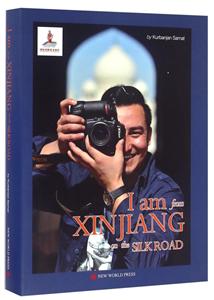-
>
世界经典文学名著系列注音版:小妇人(九品)
-
>
中考现代文阅读答题必备公式(备考2023)
-
>
作文指南--怎样描写
-
>
汉语大字典 袖珍本第二版
-
>
寂静的春天(文联平装全译本)
-
>
追随:中国打工子弟心灵笔记(签名本)
-
>
趣味科学丛书--趣味数学思考题
我从新疆来 版权信息
- ISBN:9787510457159
- 条形码:9787510457159 ; 978-7-5104-5715-9
- 装帧:一般轻型纸
- 册数:暂无
- 重量:暂无
- 所属分类:>
我从新疆来 本书特色
本书为2014年国内畅销书《我从新疆来》的英文版全译本。 维吾尔族摄影师库尔班江,通过自己的镜头和笔触向读者介绍了一个真实、鲜活的新疆,一群个性鲜明、敞开了心扉的活生生的新疆人。 作者采访了大量土生土长的新疆人,他们当中既有汉族,也有许多少数民族。本书是一本从生活角度反映当代新疆的难得作品,其中文版一经推出,立即引起内地读者的强烈反响,销量已超30万册。 本书译者为美籍华人,精通中英文,熟悉中西文化背景,在翻译过程中尽量保持了原书的风格和表述,达到了很高的翻译水准。 中文版畅销30万册展现新疆人的生活和风采王蒙作序白岩松、陈晓卿、成龙、杨锦麟等人倾力推荐
我从新疆来 内容简介
维吾尔族纪录片摄影师库尔班江·赛买提用镜头讲述的关于自己,关于新疆和新疆人的故事。《我从新疆来(英文版)》中讲述了作者和100个在内地工作和生活的新疆人。他们来自不同的民族,有着不同的年纪和性别,有着不同的宗教信仰,生活于中国社会的各个区域和角落,工作在各行各业。通过他们的故事,读者可以感知一个真实存在的新疆和生活着的新疆人,从而对新疆有全面和客观的了解。
我从新疆来 目录
Preface by Na Risong: Fellow Members of the China Family
My Past 30 Years
The Inseparable Bond of Love
Footprints for Future Generations
Home Is Best
Transient Happiness, Lasting Dream
A Feel of Xinjiang through Differences
Epilogue by Huang Zhangjin: Where Am I from?
Afterword by Kurbanjian Samat: 1 Am from Xinjiang
我从新疆来 节选
《我从新疆来(英文版)》: Stitclung Up the Cracks with Songs In 1973, I was born in an Uyghur family in Hotan. Because I had many siblings, my parents feared that they might not be able to keep me alive with their limited financial resources. So, right after I was born they gave me over to Hong Wenbiao and Yu Youchun, a Han Chinese couple on an aid mission from Chun'an, Zhejiang Province,who adopted me and named me Hong Qi. The 1970s were a time of material scarcity and it was hard to come by any milk. My mom asked a friend to get milk and cod liver oil from Shanghai and fed me therewith. As a result, I managed to survive. Four years later, my mom gave birth to her own son - my younger brother, Hong Yan, but I have never doubted they are my kinsmen. The way they loved me made me feel as if I were their biological son and my brother was the adopted son instead. As a kid, I used to bully my brother a lot, but we grew up being close friends. As a kid, I had a stubborn pride. One day in class, I had a run-in with a teacher and got driven out of the classroom. I was so mad that I bought a train ticket and went to see my grandma without telling my parents about it. When my mom heard about it,she went to Grandma's home to get me. When I knew she was coming, I immediately headed back home just to elude her. When she arrived at Grandma's house and knew I was gone, she wept all the way back home to catch me. As soon as she was home, she invited the aunt from Shanghai to testify about the process of my adoption. I was quite calm when I heard the story because even as a child I had heard people hint at it and had sensed the true account of my origin. But deep in my heart I saw this loving couple as my true parents but I never hated my birth parents who had to abandon me. I have longed to see my biological parents, but I feel happy to be where I am, because, in my opinion, I was brought up in a family of love, tolerance and understanding. By contrast, my birth parents seemed as remote as a dream. I quit school before finishing junior high and joined the army at age 17. My army unit was stationed at the edge of the Taklimakan Desert, along the Tarim River, and my main mission was to guard the labor camp. I was a free-willed person who resented the restraints of disapline in the army and I felt as if I were in "hell." After just three months in the army, I made my first attempt to escape, but got caught and sent back. When I saw my comrades write home and request to be sent back home, I did the same but never succeeded in getting what I wanted. Slowly, I got used to life there and began to understand the society and realized that I had no capacity to face the kind of competition I was involved in. The military became an important turning point in my life. My heart was fflled with passion as I observed a landscape that was totally different from the city I had grown up in. I gradually came up with an urge to write songs and sing as I strolled in the Gobi Desert, stood on night duty in the empty watchtowet, or labored on worksites in the scorclung sun. After leaving the army, I was assigned to work at the trade union of the Fourth Production and Construction Corps. When I first arrived at the office, I saw people chatting over a newspaper and immediately felt the new job was totally unfit for me. I borrowed 300 bucks from my father, took a train to Xi'an, and began a long, hard but fun career of singing. It has been a mixture of pain and joy.I have published three albums so far and have engaged in some public welfare activities such as the "focus on vagabond children" campaign. We live in a diverse and specific world. It is appropriate to say that I sympathize more with myself than with Uyghurs. Like the great majority of Uyghurs, I am socially disadvantaged because I have neither a strong background nor any special resources. I hate to see Uyghur or Han prejudice one way or the other and I can't bear extremism on either side. An important part of my future work is to use my songs to stitch up the cracked world,however ineffective it may be. Most recently, I established a cultural industrial park in the theme of Xinjiang in Shenzhen to carry out cultural exchanges. I travel frequently between Xinjiang, Beijing, Shanghai and Shenzhen, and I hope to get this project done within this year. ……
我从新疆来 作者简介
库尔班江·赛买提(Kurbanjan Samat),维吾尔族,1982年9月14日出生于新疆和田,中国摄影家协会会员,中国民俗摄影协会博学会士,中国维吾尔历史文化研究会会员,中央电视台纪录频道摄像师,自由摄影师,独立策展人。
- >
名家带你读鲁迅:朝花夕拾
名家带你读鲁迅:朝花夕拾
¥10.5¥21.0 - >
大红狗在马戏团-大红狗克里弗-助人
大红狗在马戏团-大红狗克里弗-助人
¥3.3¥10.0 - >
朝闻道
朝闻道
¥10.2¥23.8 - >
罗曼·罗兰读书随笔-精装
罗曼·罗兰读书随笔-精装
¥40.6¥58.0 - >
山海经
山海经
¥20.4¥68.0 - >
新文学天穹两巨星--鲁迅与胡适/红烛学术丛书(红烛学术丛书)
新文学天穹两巨星--鲁迅与胡适/红烛学术丛书(红烛学术丛书)
¥11.0¥23.0 - >
姑妈的宝刀
姑妈的宝刀
¥11.4¥30.0 - >
李白与唐代文化
李白与唐代文化
¥9.9¥29.8
-
呼啸山庄
¥11.4¥30 -
2022图书×抽奖盲袋
¥9.9¥25 -
2023读书月阅读盲盒——天黑,闭眼,刀谁?
¥42.3¥158 -
2022读者节纪念徽章-三星会员专属
¥45¥45.6
















